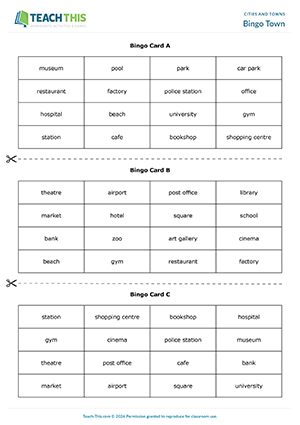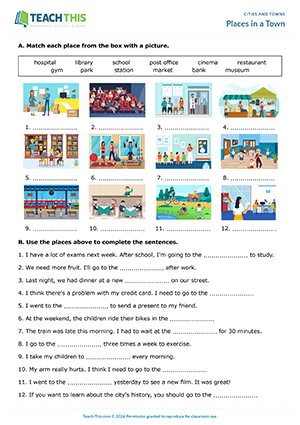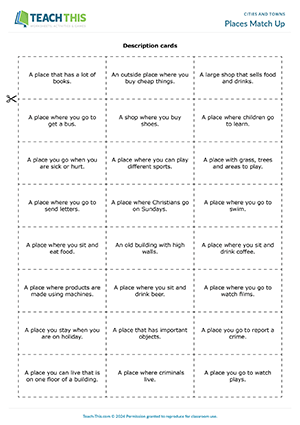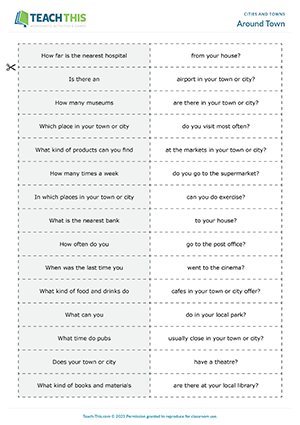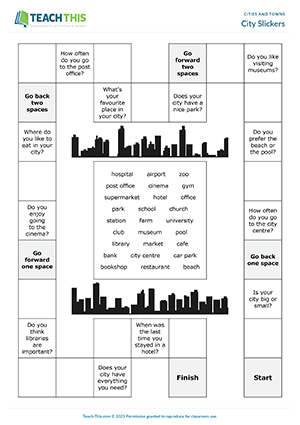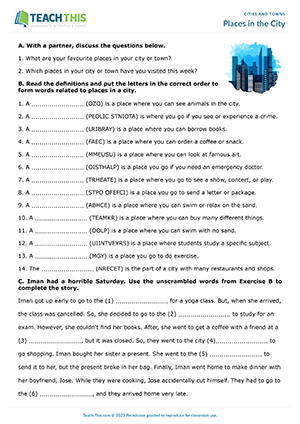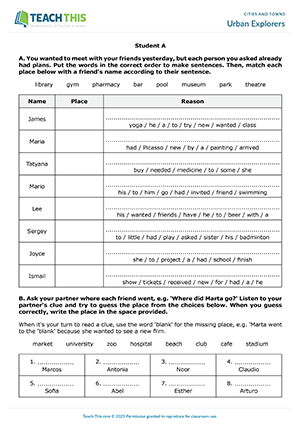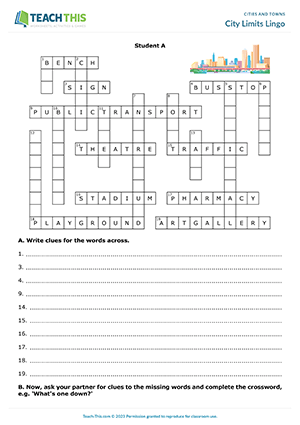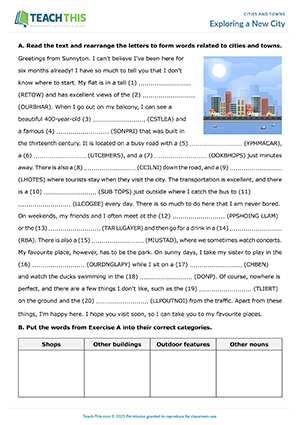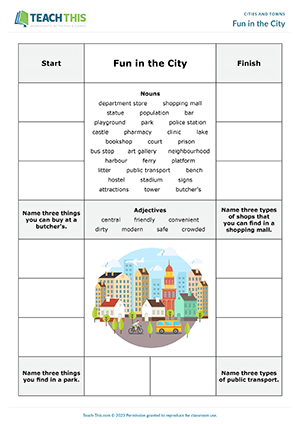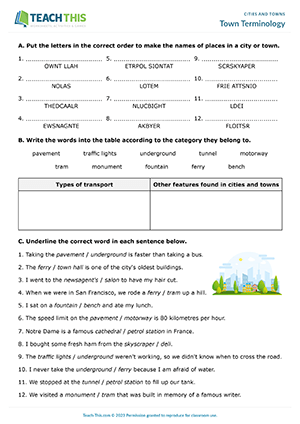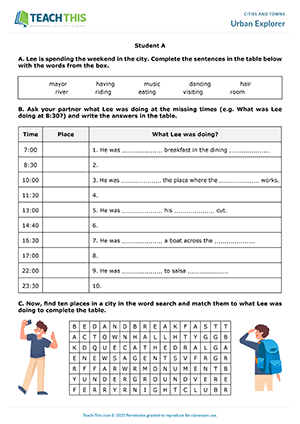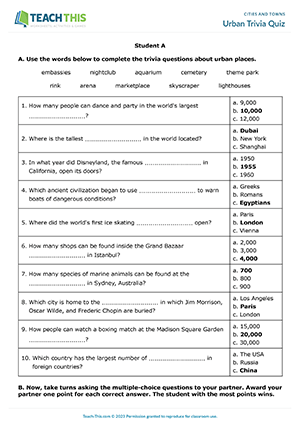In this free places vocabulary game, students play bingo by listening to definitions and matching them to the names of places commonly found in cities and towns. In groups, the bingo caller reads a place definition at random from the caller's sheet. The players listen and look at the places written on their bingo cards to see if they have a place that matches the definition. If they do, they cross it off. The game continues until a player has crossed off four places in a row. When this happens, the player shouts 'Bingo!' and then reads out the places they crossed off. If the places match the definitions that were read out from the caller's sheet, the player wins the round. Players then continue to see who can cross off all 16 places first. Groups play several rounds, with students taking turns being the bingo caller and with players using a different bingo card each time.
Here is a places in a town worksheet to help students learn and practice vocabulary for places in a town or city. First, students match places from a box with pictures. Students then use the places to complete sentences. Next, students underline the correct place to complete each sentence. After that, students write down two places from the worksheet that correspond to each statement. Finally, students complete sentences about places with their own ideas and then compare their answers with a partner.
Here are two entertaining places games to help students practice the names of places found in a town or city. Students begin by playing a game of snap. In pairs, students turn over a card from their pile at the same time. If the description card and place card match, the first student to say 'Snap' scores a point. Students then pick up their own cards, shuffle them, and play again. If a student says 'Snap' when the cards don't match, the other student scores a point, and the game continues. The first student to get ten points wins the game. After that, students move on to play a pelmanism game. Students take turns turning over one description card and one place card. If the place matches the description, the student scores one point and keeps the two cards. For an extra point, the student then tries to make a sentence with the place word. If the student successfully makes a sentence, they have another turn. If the cards don't match, the student turns them back over. The student with the most points at the end of the game wins.
In this productive cities and towns speaking activity, students form, ask and answer questions about places in a town or city. In pairs, students take turns matching two cards together to form questions about places in their town or city. When the students have finished, go through and review the questions with the class. Next, students ask and answer each question in turn with their partner, giving details and asking follow-up questions when needed. Afterwards, get feedback from the students on their answers.
In this creative city vocabulary board game, students practice words for places in a city and talk in response to city-related questions. Players take turns rolling the dice and moving their counters along the board. When a player lands on a square, another student picks up a card and reads out the sentence using the word 'blank' for the place in brackets, e.g. 'My arm really hurts. I need to go to the BLANK.' The player listens to the sentence, chooses a place word from the game board, and says it aloud to complete the sentence, e.g. hospital. If the player says the correct word shown on the card in bold, they stay on the square. If not, they move their counter back two squares. If a player lands on a question square, they answer the city-related question by talking for 20 seconds without stopping. If a player can't think of anything to say or stops talking before the 20 seconds are up, they go back two squares. The first player to reach the finish wins the game.
This free places in a city worksheet helps students practice vocabulary for public places in a city. Students begin by discussing two questions related to places in their city or town. Students then complete definitions by unscrambling words related to public places. Next, students use the unscrambled words to complete a story about a horrible Saturday. After that, students use public places vocabulary in a box to write a short story about a great Sunday. When the students have finished, they read their stories to the class, who then vote on which story sounds like the best Sunday. Students then use the words from the box to complete conversation questions related to public places. Finally, in pairs, students ask and answer the questions, giving as much detail as possible.
In this useful public places activity, students explain why people went to different public places and match the reasons with the places. In two groups, students unscramble sentences on their worksheet and then match each name with a public place according to their sentence. Next, students pair up with someone from the other group and take it in turns to ask their partner where the people at the bottom of their worksheet went, e.g. 'Where did Marta go?' Their partner then reads the sentence for that person using the word 'blank' for the missing place, e.g. 'Marta went to the 'blank' because she wanted to see a new film.' The other student listens to the clue and tries to guess the place from the choices provided. When the student guesses correctly, they write the place in the space provided.
In this handy city vocabulary activity, students complete a crossword by describing and guessing words related to cities, towns, and public places. In two groups, students invent and write down clues for the words written on their crossword. Next, students pair up with someone from the other group and take turns asking their partner for a clue to one of their missing words. Their partner reads out the clue for that word, and the other student tries to guess what it is. If the student guesses the word successfully, they write it on their crossword. If not, their partner continues to give more clues until the student is able to guess the word. Afterwards, students check their spelling by comparing crosswords.
Here is a comprehensive city vocabulary worksheet to help students practice words related to cities and towns. Students start by reading a text and unscrambling words related to cities and towns. Next, students put the words into their correct categories. Students then complete sentences using vocabulary from a box and underlining the correct word in each sentence. Lastly, students use cities and towns vocabulary in a box to write a short story about exploring a new city, changing word forms as required.
Here is a fun cities and towns board game to help students practice adjectives and nouns related to cities and towns. Students take turns picking up a card and reading the sentence aloud to the other students using the word 'blank' for the missing adjective or noun, e.g. 'There is a BLANK in the park with lots of things for children to play on'. The other students listen to the sentence and race to choose an adjective or noun from the centre of the game board and say it aloud to complete the sentence, e.g. playground. The first student to say the correct word shown on the card, rolls the dice and moves their counter along the board. If a student lands on a square beginning with 'Name three...', they have 30 seconds to name the three things required to remain on the square. If they are unsuccessful, they move back one space. The card is then placed at the bottom of the pile, and it's the next student's turn to pick up a card. The first player to reach the finish wins the game.
Here is an insightful city and town vocabulary worksheet to help students review and practice words related to cities and towns. First, students unscramble words related to cities and towns. Students then put the words in their correct categories. Next, students underline the correct word in each sentence. After that, students complete sentences using vocabulary from a box and underline the correct preposition in each sentence. Lastly, students match sentence halves and complete the endings with words from a box.
Here is an engaging places in a city speaking activity to help students review and practice words related to cities. Working alone, students begin by completing sentences about Lee's weekend in the city with words from a box. Next, students take turns asking their partner what Lee was doing at the missing times on their worksheet. Their partner gives them the answer and the student writes the sentence down. Lastly, students find ten places in a city in a word search and match them to what Lee was doing.
In this enjoyable urban places quiz, students complete trivia questions about urban places and then take part in a quiz using the questions. In two groups, students begin by completing trivia questions about urban places using the words provided. Next, students pair up with someone from the other group and take turns reading each urban places trivia question along with three possible multiple-choice answers to their partner, who tries to guess the correct one. For each correct answer, students score one point. The student with the most points at the end of the quiz wins.
Latest Free
Resources
- Jigsaw Reading
Reading Exam Preparation (B1)
Date Added: 7th of March
- Writing Jeopardy
Writing Exam Preparation (B1)
Date Added: 6th of March
- Present Perfect Bingo
Present Perfect Yes No Questions (A2)
Date Added: 4th of March
- Count on Me!
Making Offers and Promises (A2)
Date Added: 11th of February
- It’s Carnival Time!
Cultural Celebrations (B1)
Date Added: 29th of January
Latest Member
Resources
- Shops and What They Sell
Shopping (B1)
Date Added: 12th of March
- Who has written this?
Present Perfect Yes No Questions (A2)
Date Added: 11th of March
- Business Greetings and Introductions
Networking (B2)
Date Added: 11th of March
- Have you done this?
Present Perfect Yes No Questions (A2)
Date Added: 7th of March
- True, False or Not Given
Reading Exam Preparation (B2)
Date Added: 7th of March



